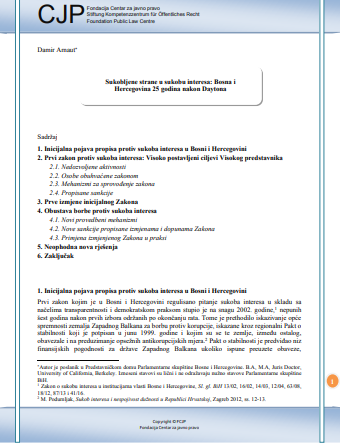Sukobljene strane u sukobu interesa: Bosna i Hercegovina 25 godina nakon Daytona
Parties to a Conflict Involved in a Conflict of Interest: Bosnia and Herzegovina 25 Years after Dayton
Author(s): Damir Arnaut
Subject(s): Law, Constitution, Jurisprudence, Public Law, Evaluation research, Transformation Period (1990 - 2010), Present Times (2010 - today), Peace and Conflict Studies
Published by: Fondacija Centar za javno pravo
Keywords: BiH; Dayton agreements; postwar period; peace and conflict; conflict of interest;
Summary/Abstract: Bosnia and Herzegovina was among the first countries in the Western Balkans region to have a law on the conflict of interest. This was not, however, due to an effort of domestic political forces, but the Law was instead imposed in 2002 by the High Representative, an international overseer with wide powers under the Dayton Peace Accords. The Law contained definitions and enforcement mechanisms modeled after the best practices in democratic societies, and included a wide array of public officials and their immediate relatives. The proscribed sanctions, however, were unduly severe, requiring in most cases that offending officials be barred from public office for a period of four years. The Law, nonetheless was successful in curbing conflict of interest in the country, and was significantly improved with several subsequent amendments. In 2013, however, the Law was substantially weakened, with enforcement powers transferred from the independent Central Election Commission to a Committee largely composed of elected officials. These changes resulted in a conflict of interest process completely controlled by political parties, subject to frequent and lasting blockades, and completely dormant in periods between elections. Indeed, the new body delivered only ten sanctions in the six years of its existence. This has created a need – voiced by Western governments, various NGO's, and several like-minded elected officials – for a completely new law on the conflict of interest. Such a Draft Law was introduced in the Bosnia and Herzegovina Parliamentary Assembly toward the end of 2017. Due to various procedural delay and blockade mechanisms invoked by the ruling parties, the Draft Law is yet to be considered by the BiH Parliament. Until this or a similar law is adopted, creating a truly independent enforcement body, Bosnia and Herzegovina is unlikely to make meaningful strides on the road to the European Union membership.
Series: Fondacija Centar za javno pravo - Projekti
- Page Count: 13
- Publication Year: 2020
- Language: Bosnian
- Content File-PDF

